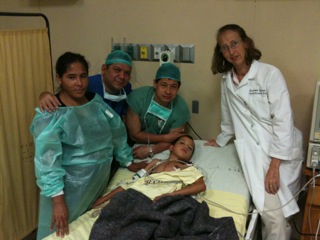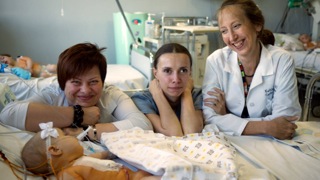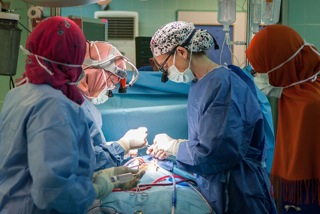ALERT!
This site is not optimized for Internet Explorer 8 (or older).
Please upgrade to a newer version of Internet Explorer or use an alternate browser such as Chrome or Firefox.
A Global Practice: My Experience with Cardiothoracic Surgery Mission Work

As an exhausted cardiothoracic resident in Atlanta driving to the hospital early one morning, I was tempted to feel a little sorry for myself until I noticed the drivers of the other cars. Suddenly it occurred to me how very lucky I was to be headed to spend the day (or maybe two days) in the operating room doing heart surgery, rather than working at a desk somewhere! This thought energized me, and I have never quite forgotten it. I could not have begun to dream then that one day going to work would involve passing through immigration and customs, and that “my team” would include people from around the world.
In 2006, I relocated to Managua, Nicaragua, to try to “rescue” the congenital heart surgery program there. Medical teams from several different organizations had been making trips to Nicaragua for more than ten years, but the local team had effectively made no progress in terms of doing surgery when a mission team was not there. This was a problem that needed to be addressed. The most important goal of a medical mission is to mentor the local team, and the best sign of success is that the number and complexity of patients the local team operates on independently gradually increases. An individual two-week medical mission trip saves the lives of, on average, 16 -25 children, but the big effect is the pyramid of children saved after the mission team leaves, when good education allows the local team to keep operating. Without this pyramid effect, only a small minority of the country’s children can be helped per year. In Nicaragua, for example, an estimated 800 -1,000 children are born every year with congenital heart defects that require surgical treatment for survival.
My initial plan was to work alongside the local surgeon and his colleagues for two or three years to help the program to move forward, and then return to a “normal” job as a cardiac surgeon in the US. I worked at first only in Nicaragua, seeing patients and operating with the Nicaraguan surgeon, cardiologists, anesthesiologist, perfusionist, and pediatric intensivist. From day one, I had to do everything in Spanish– so I learned fast! There were many problems to solve, but after about four years the program was able to function independently. The Nicaraguan surgeon could perform basic surgery and patient care on his own, and also assumed the administrative responsibilities of running the project, including: working closely with the local nonprofit organization that raises money, and dealing with the hospital administration and the ministry of health. By then, of course, I had fallen in love with this type of work and had no intention of returning to a conventional job at home. So, in 2011, I began to travel with medical teams to other countries. My home base remains Managua, but I spend about 40% of the time on the road.
Cardiac surgery is a team sport, and as surgeons we often are a little nervous about having anyone new on our team. For that reason, I have been constantly surprised at how well teams come together on medical mission trips. Of course, this requires a more detailed discussion of plans before initiating a case, and perhaps a bit of “over-communication” in the operating room and ICU, but it still is amazing to me that it often seems almost seamless. I learn new things on almost every trip. Even though I am the mentor, I learn new techniques and tricks from the local surgeons in different countries, who often come from a completely different surgical line of thought, as well as from anesthesiologists, and ICU staff from all over the world. We also see children with problems that have advanced far beyond what I ever saw in my training or practice in the United States. Each country also has its own unique culture, cuisine, and distinctive vocabulary. Similarly, each country has its own individual set of problems or reasons why it has been slow to develop pediatric cardiac surgery, so our help is different according to the local needs. Besides living in Nicaragua, in the last four years I have personally made four or more trips each to Honduras, Ecuador, Dominican Republic, Ukraine, and Libya. Making repeated trips to the same programs allows me and other team members to get to know the local staff very well, which optimizes their mentoring, as well as to participate in the follow-up care of some patients. There is an aspect of “coming home” to the same institution after repeated visits, so that it becomes not unlike surgeons who may work at various hospitals within their own institutions or practices.

Some things are the same everywhere: the love of father for his little girl is the same in Libya as in Honduras, the concerned look on the mother’s face as I explain the surgery is the same in Ukraine as in Managua, and there are young surgical residents eager to scrub on their first open heart operation all over the world. One of the most interesting and rewarding things for me personally, aside from taking care of the children, of course, has been the opportunity to meet, work with, and get to know other women from different cultures who are cardiac surgeons or trainees. Their lives are in some ways so different from mine, yet in other respects so similar.
As I write this, I am in the middle of a six-week trip traveling back and forth between Tobruk, Libya, and Kharkiv, Ukraine. The local surgeons in both of these programs are women! In Ukraine, we have a well-established program at Kharkiv Center of Cardiac Surgery, where Dr. Olga Buchneva does most types of adult and pediatric cardiac operations all year long, working with her junior partner Dr. Yaroslav Shafer. We make several trips a year with a very small team (our current team has 5 members: a surgeon, two ICU nurse educators, an ICU nurse, and a respiratory therapist) to help with more difficult cases. Olga is an extremely talented and dedicated young woman who, backed by the chief of cardiology, has almost single-handedly established the major center for cardiac surgery in eastern Ukraine. She lives with her young son in an apartment near the hospital, but I think she mostly lives in the hospital. She is training three residents, two of whom are women. Olga is an energetic, happy young woman who clearly loves her work and is a big advocate for women in cardiac surgery. I hope that when her son is older, Olga will decide to travel some with us, as I think she would be a great mentor for other surgeons who face some of the same challenges.
Although eastern Ukraine has been in a state of conflict for some time now, this has not greatly affected our program other than making air travel more difficult. Libya is a different situation. We started our program in Benghazi in 2012, and between 2012 and 2013 I personally made five trips to the Benghazi Medical Center (BMC). Beginning a pediatric cardiac surgery program at BMC had the additional benefit of helping an adult cardiac surgeon get his own program there up and running. Unfortunately, the situation became progressively more difficult, so we are currently working out of a smaller hospital in Tobruk. Not easily deterred, a number of staff members who were members of our local team in BMC now travel to Tobruk (a four-hour drive, circumnavigating ISIS-held territory) to continue working with us.

One of these dedicated people is the surgeon for the Benghazi program, a young woman named Wejdan Abo-Amer, who is from Tripoli. We met her on one of the first Benghazi trips. At that time, she was the assistant surgeon to the only practicing pediatric cardiac surgeon in the country, and the two of them came with several other members of their team from Tripoli in order to have the experience of working with us. When our in-country program started in 2013, Wejdan, accompanied by her father, relocated to Benghazi to officially become the pediatric cardiac surgeon for the Benghazi program. Wejdan and her father recently moved to a new apartment in Tobruk, where they will stay until we are all able to return to Benghazi. Wejdan is another incredibly dedicated and interested young woman, and the support she has received from her family to pursue her career as a cardiac surgeon is phenomenal. My dad was and remains a huge supporter of me and my career– but I’m not sure I could see him moving 1,000 miles away from home, and from the rest of his family, in order to facilitate it! More likely he would have encouraged me to find a good job closer to home. In fact, I suspect that would still be his preference.
Working side by side with Olga and Wejdan, as well as quite a number of young surgeons around the world, is very satisfying, particularly as I see the cardiac surgery programs begin to work more and more independently. Modern technology helps us keep in touch. Our Nicaragua team has a WhatsApp group where we share everything from scheduling information to pictures of the patient, the monitor, and sometimes even the lab results. Other programs keep in touch with us by WhatsApp, e-mail, or sometimes Facebook messages, sending us follow up information and photos of children we have helped operate, as well as information about candidates for future trips.
There is never a dull moment. Following this trip, I will be home in Managua for a short period of time and then head off to our inaugural trip for a new program in Enugu, Nigeria. It’s almost as far away from a typical office job as one can get!





Comments